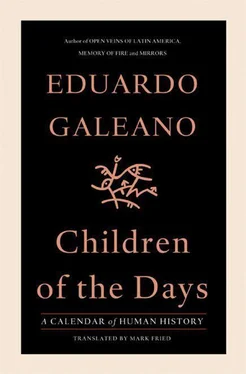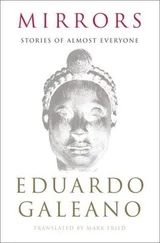In the year 2009, on the anniversary of the signing of the Universal Declaration of Human Rights, President Barack Obama received the Nobel Peace Prize.
In his acceptance speech, the president thought it wise to pay homage to war: “times when nations will find the use of force not only necessary but morally justified.”
Four and a half centuries before, when the Nobel Prize did not exist and evil resided in countries not with oil but with gold and silver, Spanish jurist Juan Ginés de Sepúlveda also defended war as “not only necessary but morally justified.”
Ginés explained that war was necessary against the Indians of the Americas, “being by nature servile men who are barbarian, uncultured and inhuman,” and that war was justified, “because it is just, by natural right, that the body obey the soul, that the appetite obey reason, that brutes obey man, women their husbands, the imperfect the perfect and the worse the better, for the good of all.”
December 11. THE POET WHO WAS A CROWD
Fernando Pessoa, the poet from Portugal, believed he lived with five or six other poets inside him.
At the end of 2010 the Brazilian writer José Paulo Cavalcanti completed his many years of research on “someone who dreamed he was many.”
Cavalcanti discovered that Pessoa did not contain five or even six: he had one hundred and twenty-seven guests in his capacious body, each with his own name, style and history, birth date and horoscope.
His one hundred and twenty-seven inhabitants signed poems, articles, letters, essays, books.
Several of them published vituperous criticisms of him, but Pessoa never kicked any of them out, even if it was not easy to keep such a large family fed.
December 12. TONANTZIN IS CALLED GUADALUPE
Long after giving birth to Jesus, the Virgin Mary traveled to Mexico.
She arrived on this day in the year 1531 and introduced herself as the Virgin of Guadalupe. By a fortunate coincidence her visit occurred precisely where Tonantzin, the Aztec mother god, had her temple.
From that moment on the Virgin of Guadalupe became the incarnation of the Mexican nation: Tonantzin lives on in the Virgin, and Mexico and Jesus share the same mother.
In Mexico, as everywhere else in Latin America, outlawed gods entered the Catholic divinities on currents of air and took up residence in their bodies.
Tlaloc brings rain as Saint John the Baptist, and as Saint Isidore the Laborer Xochipilli makes flowers bloom.
God the Father is Father Sun.
Tezcatlipoca, Jesus on the cross, points in the four directions from which the winds of the indigenous universe flow.
December 13. INTERNATIONAL DAY OF CHORAL SINGING
In 1589 Pope Sixtus V decided that castrated men should sing in Saint Peter’s Basilica.
To enable male singers to become sopranos of high notes and unbroken trills, their testicles were mutilated.
For more than three centuries castrated men took the place of women in church choirs: the sinning voices of the daughters of Eve, which would have soiled the purity of the sanctuaries, were forbidden.
December 14. THE MONK WHO ESCAPED SEVEN TIMES
In 1794 the archbishop of Mexico, Alonso Núñez de Haro, signed the sentence condemning Father Servando Teresa de Mier.
On the anniversary of the visit of the Virgin Mary to Mexico, Father Servando had given a sermon before the viceroy, the archbishop and the members of the Royal Audience.
More than a sermon, it was a cannonball. Father Servando dared to affirm that there was nothing random or coincidental about it: the Virgin Mary was the Aztec goddess Tonantzin, and Thomas the Apostle was Quetzalcóatl, the plumed serpent worshipped by the Indians.
For having committed such scandalous blasphemy, Father Servando was stripped of his title of doctor in philosophy and was forbidden in perpetuity from teaching, hearing confession or giving sermons. And he was sentenced to exile in Spain.
From that point on, he was jailed seven times and seven times he escaped. He fought for Mexico’s independence, wrote ferocious and funny attacks on the Spanish and penned serious treatises on his vision of a republic freed from colonial and military strictures — the Mexican nation as would be when it became its own lord and master.
Today would have been the birthday of Chico Mendes.
Would have been.
But the assassins of the Amazon, who kill troublesome trees, also kill troublesome people.
People like Chico Mendes.
His parents, debt slaves, arrived in the rubber plantations from the far-off desert of Ceará.
He learned to read when he was twenty-four.
In the Amazon he organized unions that united the solitary — enslaved peons, displaced Indians — against the devourers of lands and their hired guns, and against the World Bank experts who financed the poisoning of the rivers and the razing of the jungle.
Thus he was marked for death.
The gunshots came through the window.
December 16. FIGHT POVERTY: MASSAGE THE NUMBERS
For forty years the mass miscommunications media joyously celebrated steady victories in the war on poverty. Year after year, poverty was beating a hasty retreat.
So it went until today in the year 2007, when experts from the World Bank, with the assistance of the International Monetary Fund and a few United Nations agencies, updated their statistical tables on the world’s buying power. In a report by the International Comparison Program, which obtained little or no media coverage, the experts corrected some of the data from earlier measurements. Among other small errors, they discovered that the number of poor people was five hundred million more than previously recorded.
They, the poor, already knew.
December 17. THE LITTLE FLAME
On this morning in 2010, as on every other morning, Mohamed Bouazizi was hauling his cart filled with fruit and vegetables somewhere in Tunis.
As on every other morning, the police arrived to collect the levy they had concocted.
But this morning, Mohamed refused to pay.
The policemen beat him, overturned his cart and stomped all over his fruit and vegetables splattered on the ground.
Mohamed then doused himself from head to foot with gasoline and set himself on fire.
In a few days, that little flame, no taller than a street vendor, grew to encompass the entire Arab world, ablaze with people tired of being nobody.
December 18. THE FIRST EXILES
Today, International Migrants Day, is not a bad moment to recall that the first ones in human history obliged to emigrate were Adam and Eve.
According to the official version, Eve tempted Adam: she offered him the forbidden fruit and it was her fault that both of them were banished from Paradise.
But is that how it happened? Or did Adam do what he did of his own accord?
Maybe Eve offered him nothing and asked nothing of him.
Maybe Adam chose to bite the forbidden fruit when he learned that Eve had already done so.
Maybe she had already lost the privilege of immortality and Adam opted to share her damnation.
So he became mortal. But not alone.
December 19. ANOTHER WOMAN EXILED
At the end of 1919, two hundred and fifty “foreign undesirables” left the port of New York, forbidden ever to return to the United States.
Among those heading off into exile was the “highly dangerous foreigner” Emma Goldman, who had been arrested several times for opposing the draft, for promoting contraceptives, for organizing strikes and for other attacks on national security.
Читать дальше












